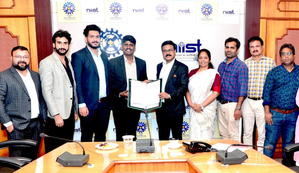Thiruvananthapuram: The CSIR-National Institute for Interdisciplinary Science and Technology (CSIR-NIIST) has inked a pact with Kerala-based Alter Wave Eco Innovations (AWEI) Pvt. Ltd. to transfer the technology it developed for manufacturing vegan leather.
The new technology allows the company to manufacture environment-friendly replacements for animal leather from plant sources like pineapple leaves, banana stems, rice straws, etc., without using plastic as a core ingredient.
C Anandharamakrishnan, Director of CSIR-NIIST, Thiruvananthapuram, and Jeswin George besides other officials were present at the signing ceremony held here at the NIIST campus.
Anandharamakrishnan said this is CSIR-NIIST’s fifth technology transfer for manufacturing plant leather alternatives, and the first of its kind from Kerala.
“The collaboration brings together NIIST’s expertise in developing cutting-edge technologies with AWEI’s desire for sustainable manufacturing based on plant-based, biodegradable, high-performing materials and will provide farmers with an additional income stream,” Director Anandharamakrishnan said.
The technology will help AWEI, based in Malayattoor in Ernakulam district, tap into nature’s abundant agricultural biomass and other bio-materials sourced from farmers and farming communities.
Kerala has about 20,000 hectares of pineapple farms, primarily concentrated in Ernakulam district.
These farms generate approximately 720,000 million tonnes of farm waste, which can be used to make vegan leather.
A CSIR-NIIST team led by Anjineyulu Kothakota, Senior Scientist at the CSIR-NIIST campus in the state capital, developed the technology for making sustainable biomaterial alternatives to animal leather.
Thiruvananthapuram-based NIIST is a premier interdisciplinary research laboratory and a constituent laboratory of the Council of Scientific and Industrial Research (CSIR).
AWEI, which will use the NIIST technology to make vegan leather, describes itself as a platform for plant-based, biodegradable, high-performing materials, “designed to remake everything.”
It provides farmers with an additional income stream by upcycling these resources into non-toxic, durable, leather-like materials for the fashion and automotive industries.
–IANS


Comments are closed.